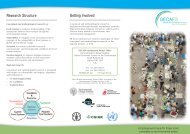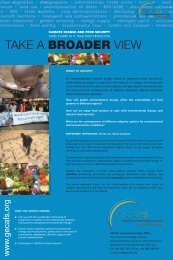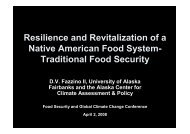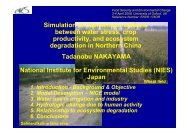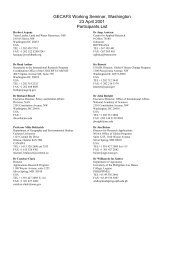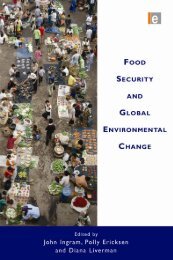Crop selection <strong>to</strong> determine mechanisms and sources of durable disease resistance. Crop selection <strong>to</strong> identify mechanisms and sources of resistance/resilience <strong>to</strong> abioticstresses including heat, cold and drought. Genetic enhancement <strong>to</strong> cope with more variable growing conditions. Development of new crops <strong>to</strong> take advantage of more favourable growing conditions. Movement of some cropping systems from locations where climate has becomeunsuitable <strong>to</strong> locations that have become more favourable.Indications of the benefits <strong>to</strong> be gained through adaptive responses are few at present, butsimulation of production for cropping systems in northern and central Italy showed that thecombined effects of increased [CO 2 ] and climate change would depress crop yields by 10–40% if current management practices were un-amended largely because of the warmer airtemperatures accelerating the phenology of current cultivars (Tubiello et al., 2000).Through a combination of early planting of spring and summer crops and the use of slowermaturingwinter cereal cultivars, though, the model indicated that it should be possible <strong>to</strong>maintain present yields. However, a major caveat <strong>to</strong> this conclusion was that 60–90% moreirrigation water was required <strong>to</strong> maintain grain yields under conditions of climate change; thiswater was assumed <strong>to</strong> be available (Tubiello et al., 2000). This brings further concerns asclimate change may lead <strong>to</strong> altered water regimes which, coupled with increased demandson water throughout temperate regions and tropical and sub-tropical regions, may lead <strong>to</strong>water scarcity (UNDP, 2006). More studies of this type are necessary <strong>to</strong> allow the mosteffective forms of adaptive strategy <strong>to</strong> be identified for specific cropping systems and specificregions, and <strong>to</strong> this end agronomists need <strong>to</strong> work more closely with hydrologists and watermanagers.Climate change may also bring new pests, diseases and weeds. It is already clear that somepests will be able <strong>to</strong> invade new areas and become increasingly problematic for themaintenance of biodiversity, the functioning of ecosystems and the profitability of cropproduction. Some pests which are already present but only occur in small areas, or at lowdensities may be able <strong>to</strong> exploit the changing conditions by spreading more widely andreaching damaging population densities. Aphids for instance, key pests of agriculture,horticulture and forestry throughout the world, are expected <strong>to</strong> be particularly responsive <strong>to</strong>climate change because of their low developmental threshold temperature, short generationtime and dispersal abilities (Sutherst et al., 2007). Again, agronomists will need <strong>to</strong> continue <strong>to</strong>work <strong>to</strong> help develop integrated pest management and other approaches <strong>to</strong> help combatthe potentially enhanced losses <strong>to</strong> pest, diseases and weeds.Agronomic research <strong>to</strong> reduce deleterious feedbacks <strong>to</strong> climateThe second major role for agronomy is in identifying methods <strong>to</strong> increase production withoutfurther exacerbating climate change (Figure 1). Options for increasing production <strong>to</strong> satisfydemand include either using new land (increasing area cropped: extensification) and/or28
increases in productivity (increasing yield per unit area: intensification). <strong>Global</strong>ly, no onemeans will be adopted and different regions will increase production in different ways(Bruinsma, 2003).Extensification will contribute <strong>to</strong> increases in production (<strong>to</strong>tal amount produced) but increasesvia this method are limited by the availability of new land, and the tradeoffs with greenhouse gasemissions and other deleterious environmental impacts (Gregory et al., 2002). About 3 billionha of the world’s land is suitable for arable agriculture and 1.2 <strong>to</strong> 1.5 billion ha of the mostproductive land is already cultivated (Greenland et al., 1998). Most of the potentially availableland is presently under tropical forests so cultivation of more of this land is undesirable withrespect <strong>to</strong> biodiversity conservation, greenhouse gas emissions and regional climate andhydrological changes. Cultivation for agriculture would also incur high costs <strong>to</strong> provide thenecessary infrastructure. In general, then, further extensification of agriculture will likelyprovide only a small fraction of the increased production needed. Typically new areas of cropland will only contribute 7.4% (51 Mha) <strong>to</strong> cereal production on a global basis by2020 with estimated contributions of extensification <strong>to</strong> crop production range from 47% insub-Saharan Africa <strong>to</strong> 18% in South Asia (Alexandra<strong>to</strong>s, 1995). It will be up <strong>to</strong> thegovernments of the countries concerned <strong>to</strong> decide whether tropical forest conversion is apolicy option for their country.Intensification will continue <strong>to</strong> be the main method for increasing food production. Gregory etal. (2002) identified three types of intensification, each of which has different environmentalfeedbacks. Type I intensification occurs when externalities and available management inputs arelimited, and is still common in much of sub-Saharan Africa. Net environmental impacts areslight. Type II intensification is largely dominated technologically by the features of the“green revolution”, and has been widely adopted from about 1960. It involves the introductionof new cultivars coupled with large increases in the use of fertilisers, herbicides, pesticides,irrigation and mechanisation. The adoption of this technology successfully achieved itsprimary aim of substantially increasing food production. At the same time, it also triggeredvery substantial negative environmental feedback processes. Hence, in the Indo-Gangetic Plain(IGP, one of the principal “green revolution” success s<strong>to</strong>ry regions) the increased adoption ofthe rice–wheat system during the last three decades has resulted in the heavy use of irrigation,fertilizers, electricity and diesel (Aggarwal et al., 2004). These practices have had a directimpact on the emissions of greenhouse gases (especially CO 2 , CH 4 and N 2 O), as well as on arange of other environmental fac<strong>to</strong>rs, and have also had some deleterious impacts on humanhealth in the region. Depending on the management practices used, emissions are estimatedcollectively <strong>to</strong> have a global warming potential equivalent <strong>to</strong> 3000–8000 kg C ha 1 year 1(Grace et al., 2003) which amounts <strong>to</strong> a significant quantity of carbon for the whole IGP.Type III intensification (“double green revolution”) necessitates a production system that is bothhigh yielding and environmentally benign. Affluent populations are pressing for this anddemonstrated examples, rare only a few years ago in part due <strong>to</strong> the absence of comparativedatasets (Gregory et al., 2002), are now beginning <strong>to</strong> emerge (e.g. Pretty, 2005).29
- Page 1 and 2: From Food Production to Food Securi
- Page 3 and 4: From Food Production to Food Securi
- Page 5 and 6: Table of ContentsAbstract .........
- Page 7 and 8: Paper 6: Undertaking Research at th
- Page 9: AbstractFood security is a conditio
- Page 12 and 13: 2010 about 925 million people had t
- Page 14 and 15: water) are used, and reduce negativ
- Page 16 and 17: While the flow of the argument abou
- Page 18 and 19: determine interactions along and be
- Page 20 and 21: Paper 3: A Food Systems Approach to
- Page 23: From Food Production to Food Securi
- Page 26 and 27: concerns and are now issues that mu
- Page 28 and 29: the relationships between GEC and f
- Page 30 and 31: Theme 2 aims to understand how comm
- Page 32 and 33: GEC and the Food System of the Indo
- Page 34 and 35: Paper 2: The role of agronomic rese
- Page 36 and 37: These advances have resulted from a
- Page 40 and 41: Agronomic science is central to imp
- Page 42 and 43: Agronomic research in relation to f
- Page 44 and 45: The discussion above identifies a n
- Page 46 and 47: interventions and political inertia
- Page 48 and 49: While research on producing food ha
- Page 50 and 51: Box 1 Food system Activities and fo
- Page 52 and 53: In addition to broadening the debat
- Page 54 and 55: options. Examples already seen rang
- Page 56 and 57: Figure 3 Outcomes for 10 variables
- Page 58 and 59: Figure 4 Nine ‘planetary boundari
- Page 60 and 61: Figure 5 Environmental change, food
- Page 62 and 63: Table 1: Indicative analysis of the
- Page 65: From Food Production to Food Securi
- Page 68 and 69: Trade Agreement (NAFTA) and the Eur
- Page 70 and 71: Parry et al., 2005). Conducting foo
- Page 72 and 73: is provided in the ESF/COST Forward
- Page 74 and 75: Paper 5: Engaging Stakeholders at t
- Page 76 and 77: into actions (strategies, policies,
- Page 78 and 79: Box 2 Engaging with stakeholders in
- Page 80 and 81: Box 3 Setting the research agenda f
- Page 82 and 83: Third, and of considerable practica
- Page 84 and 85: Figure 2: Organizing and understand
- Page 86 and 87: organizations made up of numerous n
- Page 88 and 89:
Elements of good practice in stakeh
- Page 90 and 91:
Finally, it is worth noting that fo
- Page 92 and 93:
development (Lee, 1999; Gunderson a
- Page 94 and 95:
Box 7 The GECAFS stakeholder survey
- Page 96 and 97:
‘break down’ what might be a hi
- Page 98 and 99:
Paper 6: Undertaking Research at th
- Page 100 and 101:
agriculture in many parts of the wo
- Page 102 and 103:
gaps. The presence of a strong tech
- Page 104 and 105:
an average of two years to coalesce
- Page 106 and 107:
Institute for Meteorology and Hydro
- Page 108 and 109:
Identifying case study sitesResearc
- Page 110 and 111:
can both benefit from and contribut
- Page 112 and 113:
Box 5 Mapping stakeholder interests
- Page 114 and 115:
Holding planning meetings in locati
- Page 116 and 117:
This reorientation of the debate fr
- Page 118 and 119:
Importance of this type of research
- Page 120 and 121:
Integrating the food system concept
- Page 122 and 123:
awareness of the GEC issues within
- Page 124 and 125:
pollutants were then introduced as
- Page 126 and 127:
communities operating in food syste
- Page 128 and 129:
Improving input-use efficiency acro
- Page 130 and 131:
governance focuses on the range of
- Page 132 and 133:
Developing research agendas in supp
- Page 134 and 135:
The renewed approach to interdiscip
- Page 136 and 137:
BIELAK, A., HOLMES, J., SAVGÅRD, J
- Page 138 and 139:
EAKIN, H. 2010. What is Vulnerable?
- Page 140 and 141:
GODFRAY, H. C. J., BEDDINGTON, J. R
- Page 142 and 143:
INGRAM, J. S. I. & FERNANDES, E. C.
- Page 144 and 145:
LYUTSE, S. 2010. The One Billion To
- Page 146 and 147:
RAYNER, S. & MALONE, E. L. 1998. Hu
- Page 148 and 149:
UNDP 2006. The 2006 Human Developme
- Page 150 and 151:
activities “from plough to plate
- Page 152 and 153:
contribution to the science agenda:
- Page 154 and 155:
urgently needed, and - given the gr
- Page 156 and 157:
GECAFS plannenmakerij stelde vast d
- Page 158 and 159:
ieder hun eigen groep van betrokken
- Page 160 and 161:
het gebied van beheer hebben betrek
- Page 162:
Curriculum VitaeFollowing a BSc in



